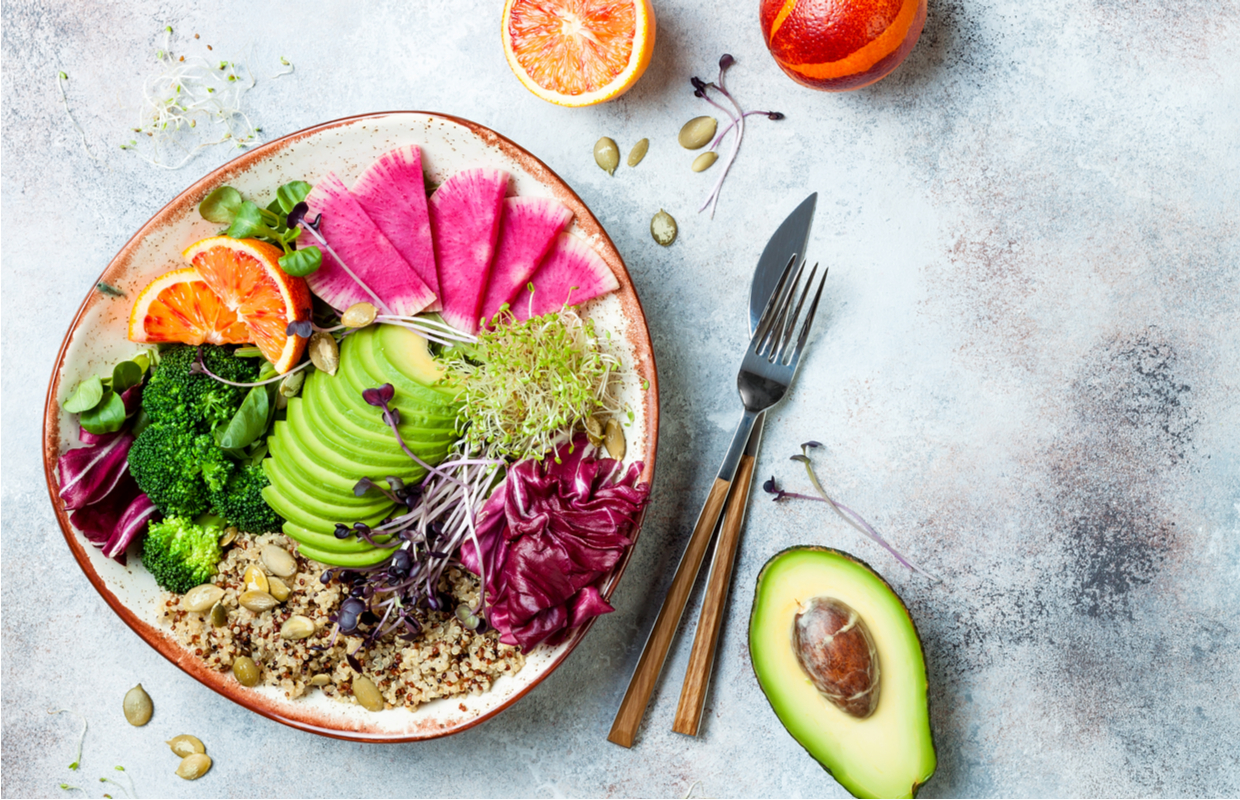All hail the power of fungi! Discover how to rebalance your gut microbiome, reduce bloating and lose belly fat with the mycobiome diet…
Words: Cathy Struthers | Photos: Shutterstock
Middle age spread. Belly fat. Bloating. Whatever you call it, we now know why so many of us are prone to a seemingly ever-expanding tum. Cutting edge science has revealed that the rate at which fats are stored and removed – our ‘lipid turnover’ – decreases as we age, regardless of whether we lose or gain weight. This makes it easier to pile on pounds, even if your diet and the amount you exercise stays the same, according to research published in the journal Nature Medicine.
The good news is that you can do something about it…and you can yield results fast. By taking control of your diet to balance the fungi in your gut, you can make over your mycobiome in just 24 hours, which in turn could help you to reduce bloating and lose belly fat. And no that’s not a typo… we’re talking about the gut’s mycobiome, which is different to the microbiome.
What is the gut mycobiome?
Most people understand the importance of a healthy gut microbiome for digestive health and overall wellbeing. But the lesser-known mycobiome is the community of fungi that live on and inside your body. Scientists are now beginning to understand that a poor balance of this fungi can lead to weight gain, bloating and low energy, and can worsen symptoms of IBS and Crohn’s.
‘The mycobiome is dynamic, shifting significantly with every meal,’ explains Dr Mahmoud Ghannoum, the fungus specialist who coined the term mycobiome and who has authored a new book about it, called Total Gut Balance (£21.99, Countryman Press).
‘We know that what you eat and do directly influences your gut fungi, and that your gut fungi, in turn, can directly influence what you weigh, how you feel, how well your immune system works, how much inflammation you have and more. Within 24 hours, you can remake your mycobiome for better or for worse based on what you decide to eat and other factors within your control,’ he says.
When you choose to make fungi-friendly food choices, you can set yourself on a fast track to rebalancing your gut, which in turn makes it easier to stay slim for good.

Gut mycobiome: good fungi verses bad fungi
Our understanding of the importance of cultivating good gut flora by balancing ‘good’ and ‘bad’ bacteria has exploded in recent years. Science is continually revealing new information about how important the microbiome (the collection of microbes that live inside the body) is to health and wellbeing. But now we are learning that there is more to your microbiome than just bacteria.
‘Fungi are a little like the black sheep of the microbiome,’ says Dr Ghannoum. ‘They are part of the microbiome – a subcommunity – but they can cause big trouble by going against the current of what is most beneficial for the microbiome’s human host (that’s you).’
Fungi are thought to contribute to all sorts gut disorders and can also spark digestive problems and inflammation in healthy people, leading to blood sugar imbalance and making it more difficult to lose weight.
Just like bacteria, there are ‘good’ fungi and ‘bad’ fungi. One of the most famous good guys is Penicillium chrysogenum, used to make penicillin, which gets rid of pathogenic bacteria. In the gut this fungus seems to be present in larger numbers among vegetarians.
On the bad side, one of the most notorious fungi is Candida albicans. It’s unproblematic when numbers are low, but harmful at higher levels, leading to weight loss resistance, infections and IBS. This yeast has been found to grow more quickly in people who eat high-sugar diets.
Of course, there are millions of fungal species, and likely many still to be discovered. And it isn’t as simple as upping the good and eliminating the bad. A healthy gut mycobiome depends on the relative levels of each. Some are helpful in small amounts, but not if they become too numerous. It’s all about balance.
How to rebalance your gut mycobiome
All sorts of factors can affect the balance in your gut. Stress, poor diet, illness or a course of antibiotics or antifungals can all knock your gut fungi and flora off kilter.
‘Gut imbalance, or dysbiosis, can seriously interfere with your life. It can cause everything from bad breath to bloating, constipation to concentration problems, diarrhoea to depression,’ explains Dr Ghannoum. ‘And when fungi are involved – such as candida overgrowing – you’ve got something akin to gastrointestinal anarchy.’
One of the big problems an imbalance of fungi can lead to is the formation of sticky biofilms that are a bit like plaque on your teeth. They coat the lining of your digestive tract and, in doing so, protect harmful fungal and bacterial microbes from the body’s immune system.
Certain foods help break down these dangerous biofilms, according to emerging research. Compounds called polyphenols found in plants, for example, can dissolve or break through biofilms. Green tea, garlic, turmeric, berries and apple cider vinegar are all thought to be biofilm-busters.
Could your poor gut health be causing chronic inflammation?
An imbalance in the gut has also been linked to chronic inflammation, which is a risk factor for certain diseases and for slowing down lipid turnover. This can lead to middle-age spread, or excess bloating. Fortunately, getting your fungi back in balance is a quick fix, but one that can lead to long-term changes to your gut health.
‘Once you begin the Mycobiome Diet, you are likely to begin noticing positive changes in your energy level and gastrointestinal symptoms within the first 24 hours,’ says Dr Ghannoum, who details the diet in his book.
After four weeks of eating to control your mycobiome, you are likely to notice changes in weight (if you have excess weight to lose). The longer you sustain this more balanced way of eating, the more lasting the shifts to your entire microbiome will be. The result? ‘You’ll enjoy bolstered immunity, reduced inflammation, fewer digestive problems, easier weight loss, more energy, less fatigue and a brightened mood,’ he says.
Mycobiome diet: improve gut health and lose belly fat
Clearly there’s more reason to max your mycobiome than just trimming belly fat. However, Dr Ghannoum believes that it can certainly help you lose weight if you need to. With chronic inflammation suspected as a prime cause of weight gain, eating for your mycobiome can help as it encourages the growth of anti-inflammatory microbes. This is mostly thanks to upping your intake of anti-inflammatory cruciferous vegetables.
By avoiding the saturated trans fats and refined sugars linked with increased belly fat and emphasising lean protein from vegetables, fish, and beans, shedding excess weight around your middle should follow.

Mycobiome diet: 4 basic rules
The mycobiome diet is uncomplicated and easy to follow. It adopts a pick and mix approach of foods to eat daily, those to eat a few times a week and details of foods to avoid (such as candida-loving sugars). You’ll include plenty of mycobiome-friendly vegetables (the wider the variety, the better), starch-resistant legumes, as well as a daily dose of biofilm-busting apple cider vinegar. Note: be sure to sip apple cider vinegar through a straw to protect your teeth enamel!
The mycobiome diet comes with four rules:
- Eat mostly whole foods (nothing processed).
- Have protein from the list below with every meal.
- Add an oil/fat or fatty food from the list below to every meal/snack.
- Have a resistant starch food from the list with every meal.
Foods to eat every day on the mycobiome diet:
- Coconut or extra-virgin olive oil.
- Resistant starch foods.
- Cruciferous vegetables.
- Mycobiome-friendly vegetables, such as broccoli, leeks and onions.
- Apple cider vinegar (at least 1tbsp).
- Optional: 2 eggs, poultry, low-fat dairy products, tofu and tempeh, edamame.
Foods to eat 3-7 times a week:
- Fish/seafood
- Ground turmeric
- Ginger
- Garlic
- Pistachios and/or walnuts
- Green tea
- Fermented foods
Foods to limit:
- Alcohol
- Maple syrup
- Raw honey
- Coffee
- Tea
Foods to exclude completely:
- Sweeteners
- Refined grains
- Processed meat
- Processed/ packaged food with more than three ingredients
- Full-fat dairy products







